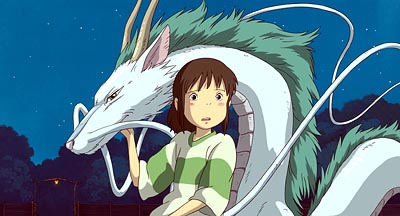I’ve been watching Spirited Away this morning. It’s one of my favourite films. I love Hayao Miyazaki’s work, it’s so original and so much of it does not need to be explained- it’s just accepted by the viewer and understood in the context of the film. I’ve found some discussion online (http://planetaryblog.wordpress.com/2007/11/19/discussion-questions-for-hayao-miyazakis-spirited-away/) that I am going to attempt to answer, mainly as practice for my writing and also to hopefully put across my views on this film.
Through Chihiro’s transformation from miserable little girl to courageous adventurer, the film suggests that the world of the spirits is necessary to help us live in the everyday world, that spiritual development is part of the solution to environmental crises. What do you think about this?
I believe this statement is correct. Before Chihiro enters the world of the Spirits, she is a spoilt, despondent girl who’s upset by leaving her friends and school. Her parents eat the food of the spirits, and consequently are turned into pigs. She is befriended and looked after by Haku, who encourages her to look after herself- she has to convince Kamajii for a job, and then again with Yubaba. She soon finds that she is helping Lin with cleaning the bath house. Her first customer is, what everyone thinks is a stink spirit. Chihiro discovers the thorn in its side, which is actually the pollution that has been dumped in the spirit’s river. She helps and saves the spirit, with no motivation other than to help a spirit in need. She then receives a reward, which she uses to save her friend Haku when he is gravely ill.
This is only one example of Chihiro’s spiritual growth. She is aware that the spirits need help to be cleansed, and this can be done by humans. Seeing the spirit as it was, and then again as a cleansed, powerful and magical river spirit, drives the point home for the viewer, and should make them think about the pollution of the rivers and seas of the world.
The character No Face (the one with the white mask who eats everything) can easily be taken as a critique of consumer society, but No Face earns a happy ending. What do you think of Miyazaki’s solution to the endless appetite of the modern world?
The character of No Face is a clever allegory for consumerist society. Consumers, to the producer/seller, do not have a face, a name, a personality. They are there to buy and consume, thus keeping the economy growing. No Face’s insatiable appetite for food, baths and entertainment, steadily grows. He watched how the workers at the bath house react to the gold left behind by the River Spirit, and learns that workers love gold more than anything else. He lures the characters close with the gold he creates, and then eats them. Before the people of the bath house witness him eating two workers, they are happy to do whatever he wants, because he is rich.
When Sen makes No Face literally regurgitate all the things he has consumed, including the bewildered workers, he goes with her on the journey to Zeniba’s house. At Zeniba’s house, No Face is shown eating small portions of cake and drinking tea. He then helps Zeniba making thread and knitting with her. This transformation means that he is rewarded; Zeniba invites him to stay with her. By consuming only what he needs, he has gained friendship.
Miyazaki’s conclusion for No Face is hopeful message, showing that no matter what a person has been like in their lives, a true and honest change of heart can benefit in a different way, earning you respect and love.
Does it make sense to think of bodies of water as possessing spirit? Have you ever had a relationship with a river, a pond, an ocean, or the rain that prompted you to speak to water? Have you ever been rescued by a body of water? Have you ever cleaned a body of water?
The notion that bodies of water and tree spirits is not only suggested in the work of Miyazaki. Some believe that the reason why people walking through a park or next to a river get a sense of peace is because of the spirits nature has a calming effect on them.
My personal take on the matter is that a body of water doesn’t have a spirit, but that it is directly harmed by humans changes it in a very potent way. We taint and destroy things that are naturally beautiful and wonderful. Even if the water doesn’t have a spirit, its integrity and wonder is often lost due to the wastefulness and destructive powers of the people who live nearby.
I have once helped to clean a body of water- the pond at my school. We hoped to introduce wildlife to the area as it was dilapidated and unclean. Sadly, my school being in a built up area, meant that no wildlife would really take root, but it helped make some friends of mine come closer together. From this experience I can see that working together in this way would strengthen communities and their relationship with their environment.
I also think that, if this film was shown to children, they would begin to associate characters and attributes of Spirited Away nature, and would start to foster ideas that they should look after and care for the planet.



No comments:
Post a Comment